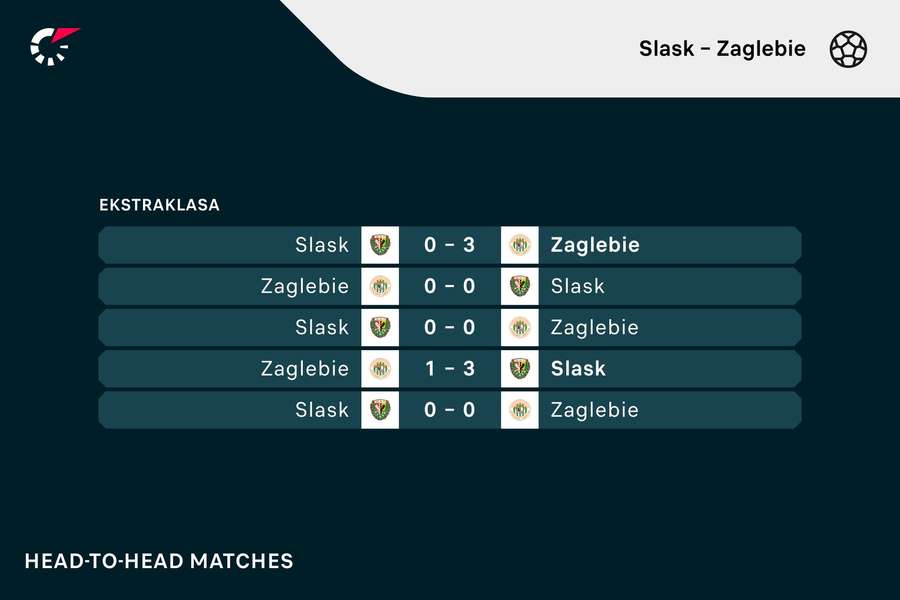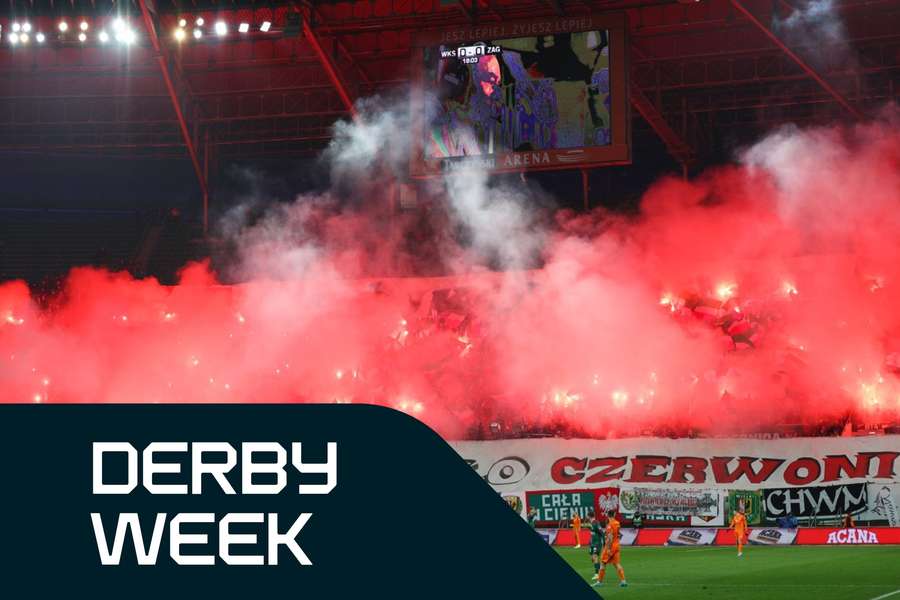Derbies are battles between irreconcilable rivals, where mutual disputes often seep through the walls of stadiums into the lives of entire cities or regions. We'll be bringing you a round-up of the most interesting and important derbies happening in the football world that week, along with interesting stories in our new regular Derby Week feature.
The battle for Lower Silesia
We can bite into a proper football steak in the 2nd round of the Polish Ektraklasa. On Saturday 29th July at 8pm, the Lower Silesian derby ('Derby Dolnego Slaska') between the two biggest clubs from the Lower Silesian Voivodeship in Poland - Slask Wroclaw and Zaglebia Lubin is set to take place.
Slask Wroclaw was founded in 1947 in the capital of Lower Silesia, Wroclaw, which has a population of over 650,000. The first name of the unit was Pionier (Pionyr) Wroclaw. A few years later the club became an army club - Centralny Wojskowy Klub Sportowy Wroclaw. The nickname of the team and its fans, Wojskowi, is also based on its military history.
The name of the whole region (Slask, Polish for Silesia) was adopted by the club in 1957. Since 2011, Slask Wroclaw's home has been the beautiful new stadium Tarczynski Arena Wroclaw with a capacity of over 45,000 spectators. The stadium was one of the host venues of Euro 2012, and the Czech national team played all of their regular group matches here: against Russia (1:4), Greece (2:1) and home team Poland (1:0).
Lubin, the home of Zaglebie, is 70 kilometres west of Wroclaw and home to over 70,000 people. The first predecessor of Zaglebie Lubin was founded by local members of the Youth Organisation of the Association of Workers' Universities (Organizacja Mlodziezy Towarzystwa Uniwersytetow Robotniczych - OMTUR) in 1945.
In the first years of its existence, the team operated only on a regional level. However, everything changed, as did the situation in the whole of Lubin, in 1957. That was when rich copper deposits were discovered in the vicinity of the town. With the establishment of the copper mine, Lubin became one of the main industrial centres of socialist Poland.
Thanks to the newly acquired wealth, the local football club also gained the ambition to start competing with the best, on a national level. KGHM Polska Miedz, the state-owned mining company, became the club's direct owner (and still is today). The club changed its name, first to Gornik ('Miner'), and later to the current Zaglebie (a term for a mining pan, the location of a mineral).
In the 1970s, the club rose from regional competitions to the second-highest league, and then in the 1980s it broke into the elite for the first time. Since 2009, Zaglebie's home games have been hosted at the modern Stadion Miejski, which seats 16,000 spectators. The club's footballers and fans are nicknamed the Miedziowi.
In the past, before the "copper" rise of Lubin and the local club, other clubs such as Gornik Walbrzych fought with Slask Wroclaw for the name of the best Lower Silesian club. However, over the last four decades, it is Zaglebie Lubin that has emerged as the second-best club in the region, and therefore Slask Wroclaw's biggest rival.
Both clubs have achieved great success in their history, even relatively recently. Slask Wroclaw won its first league title in 1977. It won the Polish Cup twice (1976, 1987), the Polish Super Cup twice (1987, 2012) and the League Cup once (2009). Slask won its second league title in the 2011/2012 season. Zaglebie Lubin is also a two-time Polish champion. Lubin won the title in 1991 and 2007. In 2007, Zaglebie players also enjoyed winning the Super Cup.
Often more crucial than winning trophies, however, is succeeding in the derby and not getting beaten by hated rivals. This is especially true for a certain group of fans - the ultras. They are, especially in Poland, an integral and very important part of football culture.
The Hooligans of Slask Wroclaw are one of the biggest and most renowned (though often in a rather negative sense) ultras factions in Polish football. Its members often hold radical right-wing views. Given the historical resentment towards the former Polish communist government, it is still not uncommon to see anti-communist slogans in the stands. The hooligans professing the colours of Slask call themselves the Szlachta z Wroclawi (Nobility of Wrocław), also to elevate themselves above the Coppermen of industrial Lubin.
The complex relationships of Polish hooligans
Since the 1970s, football hooliganism in Poland has developed into a powerful phenomenon, historically equal in scale to the hooligans in the British Isles, and now surpassing them in frequency, activity and radicalism. The relationships between the various factions are complex, not set up as 'all against all'.
One type of relationship between groups of football ultras is friendship ('zgoda' in Polish). This is an alliance between hooligans of two or more clubs. Slask supporters are in "accord" with, for example, the ultras of Lechia Gdansk or Motor Lublin. Zaglebie Lubin is in an alliance with fans of Arka Gdynia. However, there are also cross-border agreements - Slask hooligans are friendly with supporters of Ferencvaros from Hungary or with the ultras of Opava from the Czech Republic (who are opposed by an alliance of the ultras of Banik Ostrava and GKS Katowice from Poland).
The opposite, i.e. hateful relationships between the factions of football hooligans is called kosa in Polish. Typical examples are the relationships between fans whose clubs play derbies against eachother, or clubs from different regions and large cities that compete with each other in other ways than just on the football pitches.
A specific form of relationship between hooligans is the so-called cooperation agreements, which are often only temporary. The fourth type is a purely neutral relationship.
The ultras of the two biggest clubs in Lower Silesia - Slask Wrocław and Zaglebie Lubin - are of course in the most formidable opposition, the scythe. That makes Saturday's Lower Silesian derby all the more interesting and important for both clubs, both cities and the entire region.
Derby number 51
In terms of trophies won, Slask is slightly better off, but Zaglebie is slightly ahead in the balance of head-to-head matches. Out of 50 meetings so far, Zaglebie Lubin have won 21 times, Slask Wrocław have won 17 times and in 12 cases the derby ended in a draw. The last derby in January 2023 ended in a 0:3 home defeat for Slask. Moreover, they just about secured safety in the league that season.

They escaped relegation by just one point, while Zaglebie Lubin finished 9th. In the first round of the 2023/24 season, Lubin managed to turn the match around against Ruch Chorzow and clinched a 2-1 win, while Slask lost a lead in the last ten minutes against Korona Kielce to drop two points. In Saturday's Lower Silesia derby, number 51, the hosts have a lot to make up for.
This weekend's other derbies
Saturday 29 July
13:00 - Sweden - Superettan
Ostersund FK vs. GIF Sundsvall
Norrlandsderbyt (Norrland derby)
Ostersund is best known for biathlon, but in the summer, the attention of sports fans in central Sweden turns significantly to the derby between the two local clubs. The Swedish top competition Superettan is midway through (played with a spring-autumn system). The home team Ostersund FK are 6th in the table, while Sundsvall are 12th, but only 3 points separate the two teams.
Sunday 30 July
21:05 - Croatia - HNL
Jadranski derby (Adriatic derby)
The Adriatic derby between the two biggest clubs from the coastal Croatian cities of Split and Rijeka is famous for its raucous atmosphere, which is down to the fan groups of both clubs - the so-called Torcida of Hajduk Split and Armada, which is behind the HNK Rijeka footballers.
19:15 - Norway - Eliteserien
Slaget om Nord-Norge (Battle for the North of Norway)
17:00 - Norway - Eliteserien
Vestlandsderby (Vestland derby)
The Norwegian Eliteserien will feature a derby in the round of 16 (also played on a spring-autumn system). The clear table-topper (Bodo/Glimt, 41 points) will face 3rd place Tromso (30 points) in a clash between two clubs from beyond the Arctic Circle.
In the second derby of the weekend, clubs representing two major Norwegian ports will clash. SK Brann is based in Bergen, Viking FK in Stavanger. In addition, it is also a clash of teams from around the top of the table - Brann is currently in 5th position (27 points), and Viking sit in 2nd (32 points).

